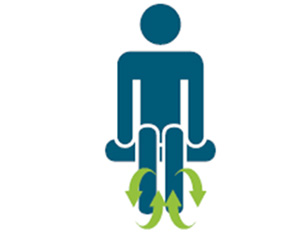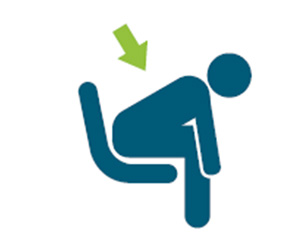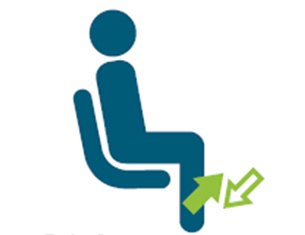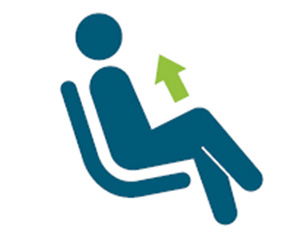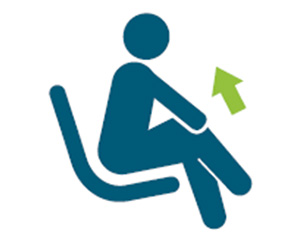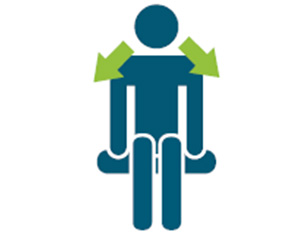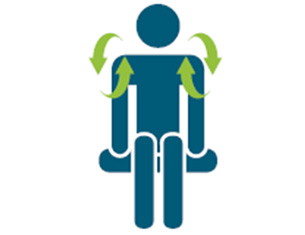Flying and Health
-
The Department of Health requires all air travellers to declare their state of health when embarking on a commercial flight. Please print and complete the questionaire that is applicable to you. A new digital version of the health questionaire has also been launched. The completion of a health questionaire is mandatory for cross border travel. Recent changes by the Department of Health means that no health questionaire needs to be completed for travel within South Africa, however temperature checks would continue when entering the airports.
Digital questionaire for travel into and out of South Africa, please click here
Questionaire for travel into South Africa, please click here
Questionaire for travel out of South Africa, please click here
Travellers that do not present a completed health questionaire to a competent authority would not be permitted to travel.
-
South Africa Health requirements and COVID-19 protocol during risk adjusted levels Collapsed Content
The President of the Republic of South Africa has allowed travel into and out of South Africa for business, leisure and other travel with effect from 01 October 2020.
The following conditions of travel are to be enforced at all times:
- On arrival, travellers need to produce a Negative Covid-19 tested result not older than 72 hours from time of departure
- Where a traveller has not done Covid-19 test prior to departure, they will be required to remain in mandatory quarantine at their own cost for the period of ten days
- All travellers will be subject to screening by Port Health Officials upon arrival and departure
- All travellers detected with symptoms will be required to remain in quarantine until a negative Covid-19 test is conducted at their own cost
- All travellers to complete Traveller Health Questionnaire prior to arrival or upon arrival at the Ports of Entry
- Beside the health protocols, travellers will be subjected to other formal border processes
- All travellers should wear masks at all times whilst within the Ports of Entry controlled area
- Port Officials to ensure that port users adhere to social distance as part of queue management protocol
South Africa business travel requirements from high risk countries
Any person from a country listed as having a high COVID-19 infection and transmission rate, who wish to undertake a business travel into South Africa, may with effect from 01 October 2020, in writing, apply to the Minister of Home Affairs and demonstrate reasons for their request to enter the Republic for business purposes during the period of the national state of disaster.
Such applications must be directed to email Covid19BusinessTravel@dha.gov.za and supported by—
(a) a copy of passport and/or temporary residence visa;
(b) proof of business activities to be undertaken in the Republic;
(c) proof of travel itinerary; and
(d) proof of address or accommodation in the RepublicPeople who are not allowed from high risk countries are leisure travellers only. Please click here for a list of high risk countries.
NB: It is the airlines responsibility to ensure that no traveller is allowed to board flights without a valid Covid-19 negative test result. Failure to adhere to this will be viewed as a contravention and might lead to penalties. Furthermore, airlines are required to ensure that all travellers to South Africa have travel insurance before embarkation.
-
South African Airways follows procedures, advice and guidelines from the Centres for Disease Control and Prevention, World Health Organisation, International Air Transport Association (IATA), and airport and customs authorities to ensure the safety of customers. In efforts to maximize the safety, health and wellbeing of our customers and crew, we adhere to the following procedures.
Please click here to read more on the recent outbreak of the Novel Coronavirus.
South African Airways follow International Air Transport Association guidelines for both onboard and on the ground.
- Cabin air quality and risk of communicable diseases transmission
- Guidelines for Maintenance Crew
- Guidelines for Cargo and Baggage Handlers
- Health guidelines for Cabin Crew
- Guideline for Passenger Agents
Contact us:
CoronaVirusCOVID-19@flysaa.com
For more information or enquiries please click here
-
When planning your next holiday, please check all the health entry requirements for your intended destination. Due to high incidents of yellow fever and other infectious illnesses, the Department of Home Affairs in South Africa has introduced a strict programme to control the spread of these diseases. Warnings have been issued to all border officials and foreign affairs missions to enforce stricter control.Please note: yellow fever vaccination is now valid for life in South Africa.According to International Health Regulations 2005, a valid international yellow fever certificate is required for all travellers:
- Over the age of 1 year old
- Travelling from a yellow fever risk country or
- Having been in transit for 12 hours or more at an airport in a country with a risk of yellow fever transmission.
Travellers who are unable to produce a valid international certificate of vaccination on arrival in South Africa will either be:- Placed under quarantine surveillance until their certificate becomes valid or a period not more than 6 days OR
- Refused entry into South Africa.
- Please note that travellers in transit in Dakar and Accra (not leaving the aircraft), do not require a certificate.
A yellow fever certificate becomes valid and offers protection 10 days after the date of vaccination.Travellers from Zambia, Tanzania, Eritrea, Somalia, Sao Tome and Principe are no longer required to produce a yellow fever certificate when coming to South Africa since those countries are now on the World Health Organization’s low risk list.If in doubt as to whether a yellow fever vaccine is required, or to make an appointment for a vaccination, please contact any SA Netcare Travel Clinic branch.List of Countries for which a Yellow Fever Vaccination Certificate is required for entry into South Africa: Last update 2017.Africa
Africa
Central and South America
Angola
Guinea
Argentina
Benin
Guinea Bisau
Bolivia
Ethiopia
Kenya
Brazil
Burundi
Liberia
Colombia
Cameroon
Mali
Ecuador
Central African Republic
Muritania
French Guiana
Chad
Niger
Guyana
Congo
Rwanda
Panama
Cote D’Ivoire
Senegal
Paraguay
Democratic Republic of Congo
Sierra Leone
Peru
Equatorial Guinea
Southern Sudan
Suriname
Gabon
Sudan
Trinidad and Tobago
Gambia
Togo
Venezuela
Ghana
Uganda
Nigeria
Low Yellow Fever Virus risk countries: Eritrea, Sao Tome, Somalia, Tanzania, and Zambia.
It is advisable to ensure your yellow fever vaccination certificate is up-to-date and valid before travelling to, via or from any of these countries.
About Yellow fever
This is an infectious disease caused by a virus transmitted by the bite of an infected mosquito. It occurs in Sub-Saharan Africa and Tropical South America and has an incubation period of 3 to 5 days. Signs and symptoms include fever, muscle pain with prominent backache, headache, shivers, loss of appetite, nausea and vomiting, and in toxic phase with severe fever and several body systems affected, including liver failure and jaundice.
SAA has co-operated with the South African Department of Health and International Health Regulations to produce this information. SAA is in no way responsible for the Regulations. New amendments or regulations will be updated from time to time, however, SAA accept no liability for any inaccuracies in the content.
-
Malaria kills more than 1 million people each year, mostly in sub-Saharan Africa. It causes symptoms that typically include fever and headache, which in severe cases can progress to coma or death.Symptoms may develop as soon as seven days after arrival in a malarial area or up to 9 months after leaving such an area. Symptoms may often be mild in the initial stages:
- Generalised body ache
- Headache
- Cough
- Fever
- Diarrhoea
It is advisable to start using prophylactic medicines before visiting a malarial area. Please consult your medical practitioner or nearest travel clinic about the type and use of these medications:- Doxicycline
- Malanil
- Mefliam
- Malarone
- Primaquine
It is also advisable to consult your General Practitioners or nearest travel clinic. -
Ebola is considered low risk to South Africa.
Read more
-
Disinsection is permitted under international law in order to protect public health, agriculture and the environment. The World Health Organization and the International Civil Aviation Organization stipulate two approaches for aircraft disinsection– (1) spray the aircraft cabin with an aerosolized insecticide while passengers are on board or (2) or spray or treat the aircraft's interior surfaces with a residual insecticide (residual method) while passengers are not on board.
Please visit: https://www.transportation.gov/airconsumer/spray for additional information.
-
Loosen your muscles and joints with these simple stretches. You can perform them in your seat, but make sure it is in the upright position. Remember to respect the personal space of fellow travellers.
- Feet: Circle your feet at the ankles - 20 times per foot.
- Legs: Starting with your feet on the floor, bring your legs slowly up towards your chest, as far as you can. Relax them slowly, and repeat three times.
- Knees: Press the knees and thighs together, and tighten buttock muscles. Hold to the count of 5, and repeat 5 times.
- Hands: Grip the edge of your armrest, and hold to a count of 5 then relax. Repeat 10 times.
- Arms: Starting with your arms outstretched, flex at the elbow, and bring them slowly into your chest. Extend them again, and repeat 5 times.
- Shoulders: Hunch up your shoulders, hold and slowly relax. Repeat 5 times.
- Neck: Move your head slowly towards your right shoulder and hold. Then towards your left shoulder and hold. Move your chin slowly down towards your chest - hold and relax. Repeat 3 times.
We recommend these exercise tips to help you to stay healthy whilst flying, particularly on longer trips.

